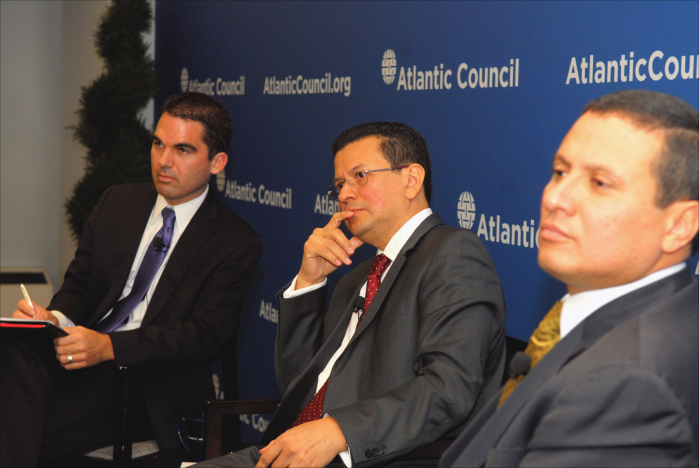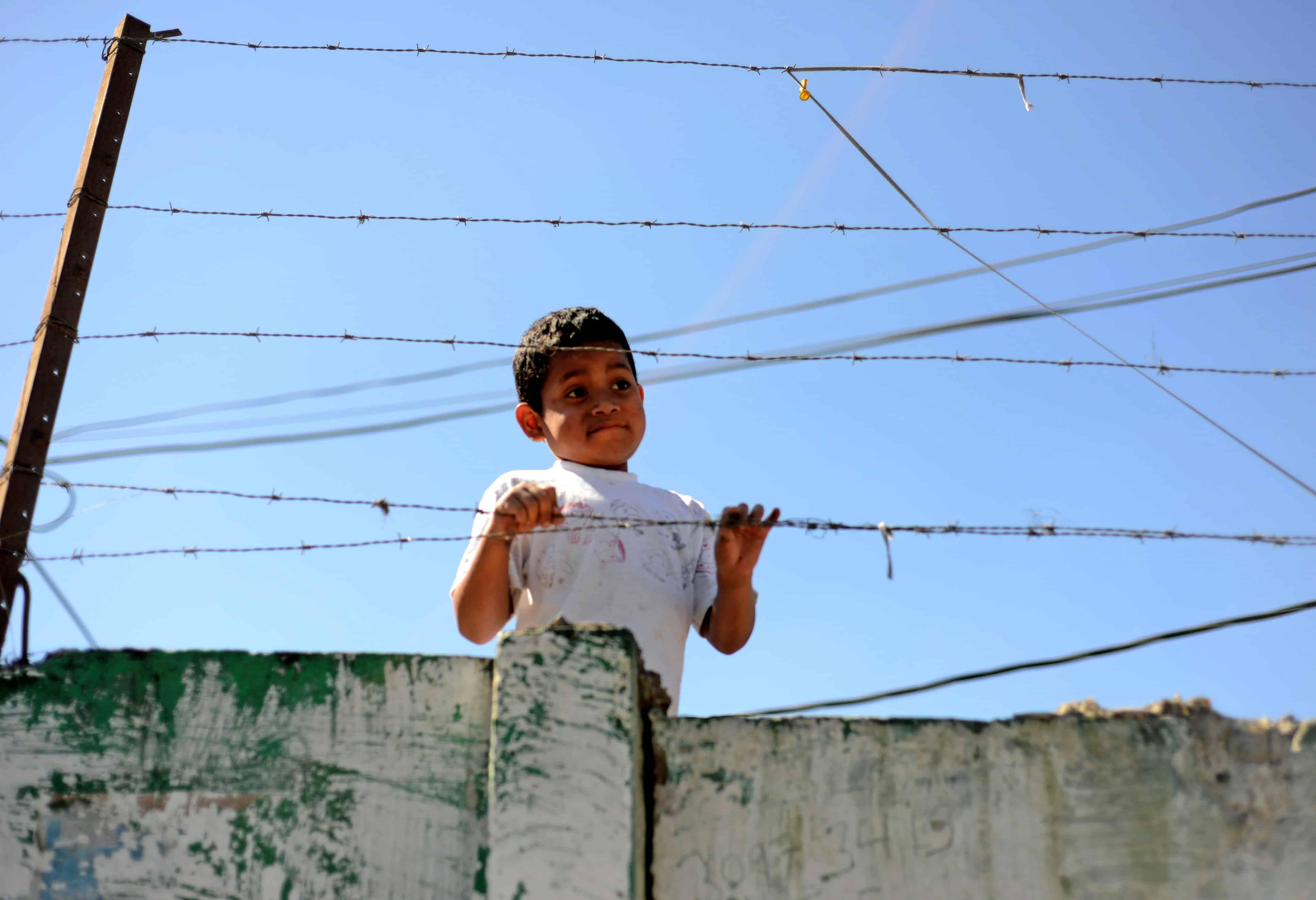WASHINGTON, D. C. – The influx of immigrants to the United States from the three countries of Central America’s “Northern Triangle” region won’t see significant reduction until those nations can stand on their own economically.
Hugo Martínez Bonilla, foreign minister of El Salvador, and his Guatemalan counterpart, Carlos Raúl Morales Moscoso, attempted to drive this message home during a Nov. 13 event at the Atlantic Council in Washington, D.C.
The seminar, “Re-envisioning the Future: A Discussion with Central American Foreign Ministers,” was moderated by Jason Marczak, deputy director at the council’s Adrienne Arsht Latin America Center. It preceded by one day a meeting at the Inter-American Development Bank’s Washington headquarters with U.S. Vice President Joe Biden and three heads of state: Salvador Sánchez Cerén of El Salvador, Otto Pérez Molina of Guatemala, and Juan Orlando Hernández of Honduras.
The three presidents had traveled to Washington in order to unveil their “Alliance for Prosperity” plan, which will largely be financed by the IDB, the U.S. government and other sources. Billed as a sort of “Plan Colombia” for Central America, the proposal aims for a total economic and social transformation of the region, including dramatic investments in job creation, crime reduction and physical infrastructure.
“You need to judge us by what we’re doing now, now what happened in our countries before,” said Martínez, alluding to the civil wars and political upheavals of the 1980s and early 1990s. We are very committed to this plan.”
A third panelist, Honduran Foreign Minister Mireya Agüero, had been scheduled to join her Salvadoran and Guatemalan counterparts on the podium, but she unexpectedly resigned the week before.
Among other things, the Alianza para la Prosperidad del Triángulo Norte – as it’s known in Spanish – calls for an overhaul of tax systems and their management in the three countries, as well as the “creation of special economic zones” that would grant preferential treatment to new investment.
“Unfortunately, even though we’re taking measures to strengthen immigration laws or have stronger border patrols, if no one tries to fix the economic situation, there will always be people moving toward the border,” said El Salvador’s Martínez. “Since there are not enough opportunities in their countries, they view immigration almost as an obligation. If we created economic opportunities in the countries where these people are coming from, then immigration would become an option, not an obligation.”
Added Guatemala’s Morales: “The lack of development forces people to emigrate. Our immigrants are very nostalgic. When I meet them here, eight out of 10 tell me they want to save money and go back home. If most of them had opportunities in Guatemala, Honduras and El Salvador, they would not emigrate.”
See also: Immigrants find themselves torn between hope, defeat on Obama’s plans

Some 180 people packed the Atlantic Council’s auditorium for the event, including representatives of think tanks, U.S. government agencies, NGOs and 12 foreign embassies in Washington. Among ambassadors in the audience: Costa Rica’s Román Macaya and Nicaragua’s Francisco Campbell.
“When I was 5 years old, I used to play with a child across the street. His name was Felipe,” recalled Martínez. “One day, all of a sudden, I didn’t see him anymore. That was in 1975. I asked my parents where Felipe was, and they told me his family had moved to the States. This was all about a lack of opportunity.”
This summer was dominated by news headlines describing the influx of tens of thousands of unaccompanied minors crossing into the U.S. from Mexico. That prompted President Barack Obama to speak out and helped bring the child migrant issue – as well as the tightening of border enforcement – to the forefront of the national immigration debate.
However, as Martínez said, “it’s much better to invest in our countries than to add 1,000 more border guards. Our people are hard workers, and are valued for their hard work. We want to develop our countries so that people will want to stay.”
Added Morales: “You can have a million soldiers at the border, and you’ll be shocked how many people will still get into the United States. That’s why investing in our economy is better than concentrating exclusively on security. The more we develop Central America, the better it’ll be for the United States. That’s the idea we’re looking for with this alliance.”
See also: For Central America’s migrant women, life can change in a second
The plan presented to the IDB has four basic pillars, said Martínez: economic development and entrepreneurship, safety and security, capital investment and human resources, and the development of capacities at the local level.
“If we do not develop all four pillars, we will not have a complete plan,” he stressed. “For example, we can make great strides in entrepreneurship with small- and medium-sized enterprises, but if we don’t concentrate on safety and security, we won’t be able to develop at the local level. Likewise, if we are able to attract investment but the human resources aren’t available, we will be taking a huge risk, because investors would then have to bring people from abroad – which is not what we’re looking for. So we have to work hand-in-hand with investors and the private sector.”
Both men stressed the need for business-friendly policies that would lure foreign companies to Central America, which would in turn bring greater stability to the region.
“The first thing we must offer is inexpensive energy. That’s something we’re pushing for right now,” said Morales, estimating that electricity costs 15 times as much in Central America as in Mexico, making operating costs prohibitively high.
He noted that Guatemala is now in discussions with Belize to connect their national grids, allowing the two neighbors to buy and sell electricity from each other; also in the works is a gas pipeline from Mexico.
“We want to improve our ports and roads. How can we tell investors to come if we don’t have the proper roads or ports for them to move their products? Human capital is essential, but we also have to keep in mind ports, so the country can develop itself. If we don’t have competitive energy prices, then investors will go to other countries where electricity is cheaper.”
Marczak asked the two foreign ministers how the Alliance for Prosperity is different from the Central American Regional Security Initiative (CARSI), a U.S. government initiative that has spent $642 million on assistance to the region since 2008.
“There’s a very big difference between CARSI and what we’re proposing,” Morales replied. “CARSI was designed for law enforcement, but our plan seeks development in the region to increase economic opportunities. CARSI was designed by the U.S. government, and our plan was designed by our governments.”
Both Mexico and Colombia are viewed by Central American leaders as success stories. Yet the Guatemalan diplomat said the stark difference between his country and Mexico is immediately apparent to anyone who crosses their shared 960-kilometer border.
“When we cross into Mexico, we see that all their communities have roads, water, electricity, schools, medical facilities. You feel the government’s presence. On our side of the border, there’s not even water or toilets. Mexico today is completely different from what it used to be.”






